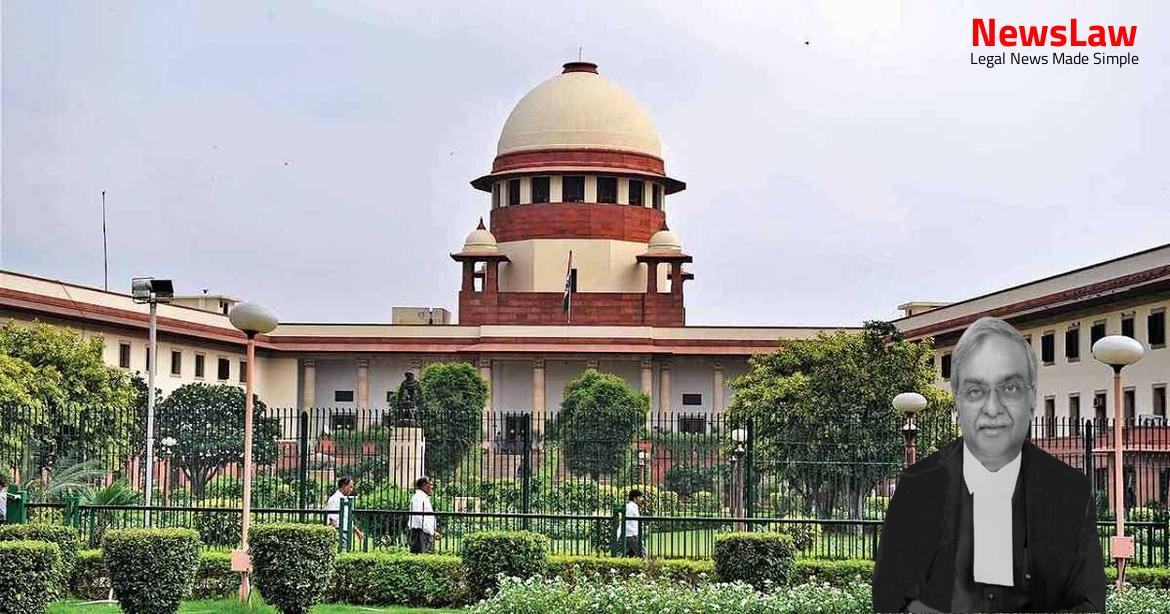Facts
- Milk producers in the State formed Primary Milk Producers Cooperative Societies.
- Federation raised objection that it is not a State under Article 12 of the Constitution in High Court.
- Federation’s counsel did not raise the issue of whether Federation is a State in the present appeals.
- Registrar (Co-operative Societies) approved decisions of the Board of Directors on various dates.
- Employees claimed revised pay scale from Punjab Government Anomaly Committee.
- Employees protested and a committee was formed to examine the issues.
- Federation issued notice under Industrial Disputes Act citing financial stringency.
- Federation’s main grievance was regarding pay scale revision from 1.1.1986.
- Registrar approved implementation of Third Pay Commission report on 2.6.1989.
- Federation granted revised pay scale and allowances from 1.1.1986 per Pay Commission report.
- District Cooperative Milk Producers Union members are part of the Primary Milk Producers Cooperative Societies.
- Federation’s employees’ service conditions governed by Punjab State Cooperative Milk Producers Federation Services (Common Cadre) Rules, 1980.
- Common Cadre Rules amended on 10.8.1990 granting revised scales from 1.1.1994.
- State Government revised pay scale of Veterinary Officers from 1.1.1986 based on Anomaly Committee report.
- Federation faced financial crisis, converting loan amount into share capital with State Government, and receiving a loan from National Dairy Development Board.
- Committee recommended and Board of Directors approved revised pay scale from 1.1.1994.
- The Division Bench of the High Court of Punjab & Haryana allowed the writ petitions filed by the employees of Punjab State Co-operative Milk Producers Federation Ltd.
- The High Court held that the Federation is considered a State within the meaning of Article 12 of the Constitution of India, making the employees entitled to pay scale equivalent to their counterparts in the State of Punjab from 1.1.1986.
- The Federation had revised the pay scale for its employees from 1.1994, which was deemed unfair by the High Court as financial stringency was not considered a valid excuse for the delay.
- The State Government communicated that revisions in allowances/pay scales should be examined based on liabilities, available resources, and extent of concessions already availed by employees of Public Sector Undertakings/Cooperative Institutions.
- Concerns were raised that automatic adoption of Punjab Government’s pay scale revisions by PSUs without considering their financial capacity results in increased costs for the PSUs, affecting their financial stability.
- Recovery of excess pay granted pending further orders was stayed by the Court on 6.11.2009.
- Suggestions were made to discontinue the practice of adopting pay scale revisions without considering financial implications, as the State Government may not support financially in such cases.
Also Read: Critical Analysis of Circumstantial Evidence in Arson Case
Arguments
- The argument of the employees claiming equal pay for equal work was not examined by the High Court.
- The respondents are Milk Procurement Assistants Grade-I and an Animal Husbandry Assistant in the same pay scale.
- Financial stringency was deemed not a valid excuse for refusing to revise pay scales from 1.1.1986.
- A higher pay than recommended by the Pay Commission was granted, consciously decided by the Committee.
- The writ petitioners are employees of the Federation with no work for the post to which they were appointed.
- The decision to not grant the revised pay scale on the basis of the report of the Committee of the Federation w.e.f. 1.1994 was deemed arbitrary and discriminatory.
- The High Court restricted arrears of the revised pay scale for a period of 3 years and 2 months from the date preceding the date of filing respective writ petitions.
- Employees are claiming parity in pay with Area Officers including Deputy Manager (Procurement) and Dairy Extension Officer.
- Designation of Milk Procurement Assistants Grade-I changed to a new designation from 2.1987.
- Judgments referenced by the High Court were deemed inapplicable to the present case.
- The Federation’s claim of financial stringency was contested, citing information showing profits since 1996-1997.
Also Read: Analysis of Commencement Date in Gratuity Act Amendment Case
Analysis
- The Federation’s objective was to increase milk production, not provide employment.
- The decision to grant a revised pay scale was based on financial considerations and not discriminatory.
- Qualitative differences in responsibilities existed between Grade-I and Grade-II employees.
- The employees did not challenge the High Court’s order in appeal.
- The employees’ argument for equal pay for equal work was deemed baseless.
- The Federation’s financial condition was a crucial factor in the decision-making process.
- The employees’ claim for revised pay scale from 1.1.1986 was unfounded.
- The decision-making process and the decision itself were found to be legally sound.
- Employer and employees need to work together towards the organization’s objectives.
- The High Court decision ordering payment of arrears was not perceived as eliminating financial burden on the Federation.
- The posts held by employees were considered different from those of Deputy Manager/Dairy Extension Officer.
- The financial capacity of the government to levy taxes for meeting state expenses was highlighted.
- Boards and Corporations need to rely on their own resources or seek grants for expenditures.
- Granting higher pay scales to government employees differs from granting pay scales by a state instrumentality.
- Judicial examination of pay revision cases considered financial constraints, social welfare objectives, and equal pay for equal work.
- Financial stringency and power of Chief Justices in granting pay scales were discussed in various cases.
- Judicial scrutiny over pay scale revisions based on financial viability and consideration of employee benefits was emphasized.
- Order of the High Court deemed unjustified and exceeding power of judicial review
- Classification of pay scales based on educational qualifications, experience, and nature of duties upheld
- Employees not entitled to the pay scale claimed in the writ petition
- Argument for equal pay for equal work found to lack merit
Also Read: Interpretation of Will and Hindu Succession Act: Legal Analysis
Decision
- The appeals are allowed.
- The orders passed by the High Court are set aside.
- The writ petitions are dismissed.
Case Title: PUNJAB STATE CO-OP MILK PROD.FED.LTD Vs. BALBIR KUMAR WALIA (2021 INSC 326)
Case Number: C.A. No.-007427-007427 / 2011



